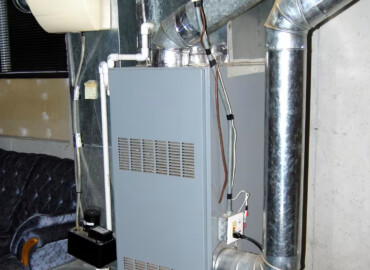Why does my Furnace Smell Like Its Burning
If you’ve ever noticed a distinct burning odor emanating from your furnace, you’re not alone. The smell of something burning can be concerning and may leave you wondering about the potential causes and safety implications. While there can be several reasons why your furnace smells like it’s burning, it’s essential to understand the common culprits behind this issue.
From accumulated dust and debris to clogged air filters and overheating components, exploring these factors can help shed light on the source of the odor and guide you in taking appropriate actions to address the problem.
6 Reasons Your Furnace Smells Like Its Burning
1. Accumulation of Dust and Debris
Accumulated dust and debris within your furnace can be a common cause of a Furnace smell like it’s burning.
Reasons for accumulation of Dust and Debris
- Dust accumulation – Over time, dust and other particles settle inside the furnace, particularly in areas like burners, heat exchangers, or blower motors. These components generate heat when the furnace operates.
- Burning off – When you turn on the furnace, the accumulated dust and debris may get heated up quickly. As a result, they burn off and produce a distinct burning smell. This smell is often more noticeable when you first start using the furnace after a long period of inactivity, such as during the start of the heating season.
- Temporary issue – The burning smell from accumulated dust and debris is usually a temporary issue. Once the initial burning-off process is complete and the accumulated particles have been cleared, the smell should dissipate within a short period.
Prevention and solutions
- Regular maintenance – To prevent excessive dust accumulation, it’s important to schedule regular maintenance for your furnace. This includes cleaning and inspecting the components to remove any build-up and ensure proper operation.
- Air filter maintenance – Keep your furnace’s air filter clean or replace it regularly. A clean air filter allows for better airflow, reducing the amount of dust and debris that enters the system.
- Professional cleaning – Consider hiring a professional HVAC technician to perform a thorough cleaning of your furnace. They can clean the internal components, including the burners, heat exchanger, and blower motor, to remove accumulated dust and debris.
Remember, if the burning smell persists or you are unsure about the cause, it’s always best to contact a professional HVAC technician. They can inspect your furnace, identify the source of the odor, and provide appropriate solutions or repairs to ensure safe and efficient operation.
2. Clogging of Air Filters
A clogged air filter is another common reason why your Furnace smells like it’s burning.
Reasons
- Restricted airflow – The air filter in your furnace is responsible for trapping dust, dirt, and other airborne particles to keep the system clean. However, over time, the filter can become clogged with accumulated debris, reducing the airflow through the furnace.
- Overheating – When the airflow is restricted due to a clogged air filter, the furnace may struggle to circulate air properly. As a result, the furnace can overheat, causing components such as the heat exchanger or blower motor to become hotter than usual.
- Burning odor – The overheating of components due to restricted airflow can produce a burning smell. The smell may be more noticeable near the vents or when the furnace first starts up.
Prevention and solutions
- Regular filter maintenance – Check your furnace’s air filter regularly and clean or replace it as needed. The frequency of filter changes depends on the type of filter and the level of dust in your environment. A good rule of thumb is to inspect the filter monthly and replace it every three months or as recommended by the manufacturer.
- Use high-quality filters – Consider using high-quality air filters that have a higher MERV (Minimum Efficiency Reporting Value) rating. These filters can trap smaller particles and provide better air filtration, reducing the likelihood of clogging.
- Professional maintenance – Schedule regular professional maintenance for your furnace. During these visits, the HVAC technician can inspect and clean the air filter, as well as other components of the furnace, ensuring efficient operation and minimizing the risk of overheating.
If you notice a burning smell coming from your furnace and suspect a clogged air filter, turn off the furnace and replace the filter if necessary. However, if the smell persists or you have concerns about the situation, it’s advisable to contact a professional HVAC technician for further evaluation and assistance. They can inspect the furnace, identify any underlying issues, and provide the appropriate solutions.
3. Overheating of components
When the components of your furnace overheat, it can result in a Furnace smell like it’s burning.
Reasons for overheating
- Electrical issues – Faulty or damaged electrical components within the furnace, such as wiring, circuit boards, or motors, can lead to overheating. This can be caused by loose connections, short circuits, or excessive electrical resistance. Overheating electrical components often emit a distinct burning odor.
- Motor problems – The blower motor in your furnace is responsible for circulating air throughout the system. If the motor is malfunctioning or has worn-out bearings, it can generate excessive heat, leading to overheating. This can produce a burning smell.
- Blocked vents or ductwork – If the vents or ductwork in your home are obstructed or blocked, the airflow to and from the furnace can be restricted. Insufficient airflow can cause the furnace to work harder, leading to overheating of various components and the generation of a burning odor.
- Lack of maintenance – Regular maintenance is essential for keeping your furnace in good working condition. If the furnace is not maintained properly, components can become dirty, dusty, or worn out, leading to inefficient operation and potential overheating.
Prevention and solutions
- Professional inspection and maintenance – Schedule regular professional inspections and maintenance for your furnace. A qualified HVAC technician can identify and address any electrical or mechanical issues that could lead to overheating. They can clean the components, lubricate the motor if necessary, and ensure everything is functioning correctly.
- Keep vents and ducts clear – Regularly check and clean the vents and ductwork in your home to ensure proper airflow. Make sure they are not blocked by furniture, curtains, or other objects. Clearing any obstructions helps maintain efficient operation and prevents overheating.
- Address electrical problems promptly – If you suspect electrical issues in your furnace, such as flickering lights, frequent tripping of breakers, or burning smells, it’s important to have them inspected and repaired by a professional electrician or HVAC technician. Do not attempt to fix electrical problems yourself, as it can be dangerous.
- Replace worn-out components – If your furnace has worn-out motors or other components that are causing overheating, it may be necessary to replace them. Consult with a professional technician who can assess the situation and recommend appropriate replacements.
If you notice your Furnace smells like it’s burning due to overheating components, it’s advisable to turn off the furnace and contact a professional HVAC technician. They can safely inspect the system, identify the cause of overheating, and perform the necessary repairs to ensure the safe and efficient operation of your furnace.
4. Leaking of Oil and Gas
If your Furnace smells like it’s burning and you suspect an oil or gas leak, it’s crucial to take immediate action as it can be dangerous. Oil and gas leaks in a furnace can be dangerous and require immediate attention.
Reasons
- Faulty connections – Improperly connected or loose fittings and connections in the oil or gas supply lines can result in leaks. Over time, these connections can degrade or become worn, leading to oil or gas escaping from the system.
- Aging equipment – Old furnaces or boilers may develop cracks or corrosion in their components, including fuel lines, valves, or tanks. These weakened areas can allow oil or gas to leak out.
- Mechanical damage – Accidental damage to the furnace, such as impacts or excessive vibration, can cause cracks or breaches in the oil or gas lines. This damage can result in leaks and potential hazards.
- Wear and tear – Normal wear and tear over time can cause degradation of fuel lines, seals, gaskets, or other components in the furnace. These deteriorated parts may lead to oil or gas leaks.
- Poor installation – Improper installation of the furnace or its fuel lines can contribute to leaks. This can include mistakes in connecting the oil or gas lines or using incorrect fittings or materials.
- Lack of maintenance – Inadequate maintenance and regular servicing of the furnace can increase the risk of leaks. Failure to inspect and replace worn-out components or address potential issues can result in oil or gas leaks.
Prevention and solutions
- Turn off the furnace – If you suspect a fuel leak, shut off the furnace immediately. Locate the emergency shut-off switch or valve on the furnace and turn it off. This will stop the fuel supply to the furnace and minimize the risk of a fire or explosion.
- Evacuate the premises – If you smell a strong odor of gas or suspect a significant oil leak, it’s important to evacuate your home. Open doors and windows to allow for ventilation while leaving the premises. Avoid using any electrical switches, as they can generate sparks.
- Contact professionals – Once you are safely outside, contact your utility company’s emergency line or a professional HVAC technician with experience in handling fuel-related issues. They will be able to provide guidance and arrange for an immediate inspection.
- Do not use open flames or electrical devices – In the presence of a fuel leak, avoid using any open flames, such as matches or lighters. Additionally, refrain from using electrical devices, including phones, that can create sparks and ignite the leaked fuel.
- Follow professional advice – The utility company or HVAC technician will assess the situation and take appropriate action. They may need to inspect the furnace, repair any leaks, or shut off the fuel supply to prevent further hazards. Follow their instructions and do not attempt repairs yourself.
Remember, fuel leaks are serious safety concerns, and it’s essential to prioritize your well-being and that of others in your household. Taking quick action, contacting professionals, and following their guidance will help ensure everyone’s safety.
5. Improper installation
If your furnace smells like it’s burning and you suspect improper installation as the cause, it’s important to address the issue promptly. Improper installation can lead to various problems, including potential fire hazards.
Prevention and solutions
- Hire a professional – If you suspect that your furnace was not installed correctly, it’s advisable to contact a qualified HVAC technician or a professional heating contractor. They have the knowledge and expertise to assess the installation and identify any issues or safety concerns.
- Inspection of the installation – The HVAC technician will inspect the furnace installation thoroughly. They will check for proper venting, adequate combustion air supply, appropriate electrical connections, and compliance with local building codes. They may also inspect the ductwork and other related components.
- Corrective measures – Depending on the findings, the technician will recommend the necessary corrective measures. This may involve reinstalling certain components, adjusting ventilation, ensuring proper electrical connections, or addressing any other issues identified during the inspection.
- Follow professional advice – It’s crucial to follow the advice and recommendations provided by the HVAC technician. They may suggest repairs, replacements, or modifications to ensure the safe and proper operation of your furnace.
Addressing improper installation is crucial for the safety and efficiency of your furnace. By involving a qualified professional, you can rectify any installation issues and ensure that your furnace operates as intended.
6. Burning off protective coatings
If your furnace smells like it’s burning, particularly when it is first used, it could be due to the burning off of protective coatings.
Prevention and solutions
- Protective coatings – During the manufacturing process, some furnace components, such as the heat exchanger or other internal parts, may be coated with protective substances. These coatings serve to prevent corrosion, oxidation, or damage during storage and transportation.
- Initial usage – When you first start using the furnace, the heat generated during operation can cause these protective coatings to burn off. As a result, you may notice a distinct burning smell, which is usually temporary.
- Odor duration – The burning smell from protective coatings typically lasts for a short period, usually within the first few hours or days of using the furnace. Once the protective coatings have burned off completely, the smell should dissipate.
- Air out the area – To help eliminate the smell, you can open windows or use ventilation to allow fresh air to circulate in the area where the furnace is located. This can help remove any lingering odors.
- No cause for concern – In most cases, the burning off of protective coatings is a normal and harmless occurrence. However, if the smell persists for an extended period or you have other concerns about the furnace’s operation, it is always advisable to consult a professional HVAC technician for further evaluation.
It’s important to note that while burning off protective coatings is a common cause of a temporary burning smell, there could be other factors contributing to the odor. If you have any doubts or the smell persists, it’s best to have the furnace inspected by a professional technician to ensure proper functioning and rule out any other potential issues.
Note – The information provided in this article is for general guidance. The specific steps and protocols may vary depending on your location and the guidelines of your utility company. Always follow the advice of professionals and emergency services in your area.




